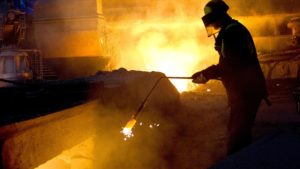
Unions have warned on the future of UK steelmaking after British Steel announced it will shut its coking ovens in Scunthorpe and cut up to 260 jobs.
The Chinese-owned firm blamed an “unprecedented” rise in energy costs and demands to be greener.
The biggest steelworkers’ union said the cuts could have a “catastrophic impact” on steel production in the UK.
Coking ovens turn coal into coke which burns at the higher temperature needed for furnaces used in steel production.
The closure of the ovens at its Scunthorpe headquarters, which means British Steel will import coke, has been seen as a concerning indicator about the health and future of the UK steel industry.
The government said the decision by British Steel was “very disappointing” while negotiations were ongoing with the sector over funding support.
British Steel currently employs around 4,200 workers in the UK and is owned by Chinese company Jingye.
Making steel requires a lot of energy, and with prices soaring in recent months, the costs of making the metal have also gone up.
The company said its energy bills and carbon-offsetting costs increased by £190m last year and “decisive action” was needed.
It added that its coke ovens were “reaching the end of their operational life” and that closing them would “bring environmental benefits including reductions in emissions to air and water”.
‘Come clean’
Alun Davies, national officer of the Community Trade Union, which represents the majority of steelworkers, said the union would “not accept redundancies” and added “nothing is off the table when it comes to protecting our members’ jobs”.
“British Steel’s plan to close the coke ovens could have a catastrophic impact on jobs and steel production at Scunthorpe and the UK as a whole,” he added.
Mr Davies claimed closing the ovens would see the company “depending on unreliable imported coke” wand would “risk our sovereign capability to produce steel in the UK”.
The Unite union, which also represents steelworkers, accused Jingye of reneging on investment promises and said the UK government had “no serious plan for the industry”.
General secretary Sharon Graham added that she was yet to see “any financial justification for the closure of the coking ovens”.
But British Steel chief executive Xifeng Han said steelmaking in the UK was “uncompetitive” when compared to other international markets.
“Our energy costs, carbon costs and labour costs are some of the highest across the world, which are factors that we cannot influence directly,” he said.
Mr Han said the plan was to “streamline” the business while keeping “the period of uncertainty for our colleagues as short as we can”.
He said the company was undergoing its biggest transformation in its 130-year history, “to make sure we can deliver the steel Britain requires”.
The government has been holding negotiations with British Steel’s owners over a £300m support package, along with others in the industry.
The government said it would continue to work with British Steel to find a “solution for the business and the wider sector, which plays a vital role in the UK economy”.
Jingye has invested £330m in British Steel since it bought the business in 2020. Mr Han said the owners were “committed” to the company for the long term, but warned the transition to greener forms of energy to make steel was a “major challenge”.
Government offers to the firm have so far been rejected on the basis they come with too many strings attached, including job guarantees for 10 years, union sources have previously told the BBC.
The offers are also too small to help with the estimated £2bn cost of transitioning from blast furnaces to more energy efficient electric arc furnaces, they said.
Jonathan Reynolds, Labour’s Shadow Business Secretary, said workers needed “a government on their side securing the bright future our steel sector could have”.
Read more:
Warning over future of British Steel as it cuts jobs






